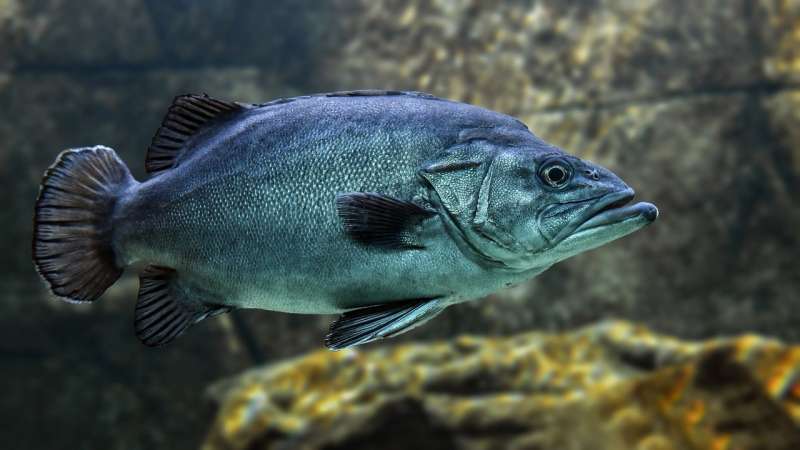Fish more tolerant than expected to low oxygen events

Fish may be more tolerant than previously thought to periods of low oxygen in the oceans, new research shows.
The surprising discovery, from research by the University of Exeter and the Centre for Environment, Fisheries and Aquaculture Science (Cefas), was made when investigating the importance of carbon dioxide (CO2) during hypoxic (low oxygen) events.
The study shows that natural increases of carbon dioxide during low oxygen events make sea bass 20% more tolerant to hypoxia.
Researchers believe this occurs because the blood chemistry of sea bass changes in response to higher CO2 levels.
In turn this makes it easier for hemoglobin in their red blood cells to transport oxygen during a hypoxic event.
"The standard methods used to measure the response of fish to hypoxia do not usually take into account the associated rise in CO2 levels that always simultaneously occur in nature," said lead author Daniel Montgomery, a marine biologist at the University of Exeter.
"During hypoxic events, respiration by bacteria in the water causes CO2 levels to increase as oxygen drops.
"Our results indicate that this CO2 may play a key role in the ability of fish to tolerate hypoxic events, by enabling their blood to continue absorbing oxygen at lower environmental oxygen levels."
Improving our ability to predict the consequences of hypoxia for fish species is critical.
We know already that climate change is increasing the occurrence and severity of hypoxic events in oceans across the globe.
This means that hypoxia tolerance may become increasingly important for the success of many fish species.
"Although our results indicate that fish may be more resilient to hypoxia than previously thought it is key to remember that fish are also having to cope with multiple stressors in their environment," Montgomery said.
"Climate change is causing warming of the world's oceans as well as increased hypoxic events and fish in warmer waters are more vulnerable to low oxygen conditions."
The researchers studied responses to hypoxia in European sea bass (Dicentrarchus labrax), an ecologically and economically important species in Europe.
They now aim to investigate how common this response is in other fish species and how climate change will impact hypoxia tolerance of these fish.
Dr. Silvana Birchenough, co-supervisor of this work based at Cefas, said: "This research is vital to understand how fish species will be able to adapt and react as climate change alters environmental conditions in the oceans.
"This work will enable us to improve empirical data to test and evaluate our current models of how fish populations will be affected in the future, providing the potential for making better predictions and thus protecting and conserving our fish stocks under a changing climate."
Daniel's Ph.D. supervisor at the University of Exeter, Professor Rod Wilson, said "At one level Dan's work provides an elegant example of how environmental CO2 influences blood chemistry which then exquisitely enhances the ability of hemoglobin in fish red blood cells to manage oxygen delivery to their tissues.
"At the other end of the scale, it suggests a profound influence of these molecular processes on the fitness of individual animals, and ultimately the likely fate of fish populations in our rapidly changing oceans."
The paper, published in the journal Scientific Reports, is titled "Rising CO2 enhances hypoxia tolerance in a marine fish."
More information: Rising CO2 enhances hypoxia tolerance in a marine fish Scientific Reports, doi.org/10.1038/s41598-019-51572-4
Journal information: Scientific Reports
Provided by University of Exeter




















